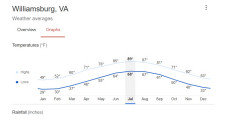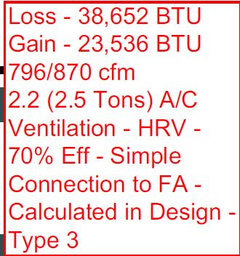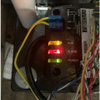Ruud, Goodman, American Standard and Lennox Merit - Which is better?
2 years ago
Featured Answer
Sort by:Oldest
Comments (43)
- 2 years ago
- 2 years ago
Related Discussions
Comparisons of Brands-Lennox, Trane, Carrier, York, Bryant
Comments (21)My house was built in July 2002; and has 2 systems (2 furnace and 2 A/C). The past October 2012, I was told that the blower is heating and there is a small crack on the heat exchanger. The recommendation was to change the blower motor for $575 or replace furnace for $3,900 on Goodman or replace furnace and A/C with 4 ton 14 seers 410A for $8,500 on Trane. The old system is R22. I was told that with R22, if it needs freon, it will cost tons of money. Can someone please give me some advise which way to go? Is the price of $8,500 for 4 ton, 14 seers 410A on Trane reasonable? Health wise, is the small crack on the heating exchange not dangerous? I would appreciate comments/advise. Thank you....See More2 ton ruud vs american standard 13 seer (in norhtern va)
Comments (17)nysaclk2829,ruud is a middle of the line unit.You have read that ruud is inferior to Trane because it is true.You have probably read that installation is a very impportant factor in equipment life and operation,which is also true.Bob, Trane is going to be the mother company soon instead of american standard(not that I care) TRANE WILL MAKE AMERICAN STANDARD.Trane climatuff compressors are made in Tyler Texas and are the toughest compressors made hands down.I hated the idea of them leaving them and going to a copeland scroll after having so many successful years with the climatuff atleast they put their own patents and still must pass the SEET test. nysaclk2829 ask your dealers if you can go to a showroom or distributor so you can see,touch and judge the quality differences for yourself.I sold Ruud as a second line for a while .I stopped after having evaproator leak problems and doa compressors.I hear they have done some changes to their design....See MoreWhat seems to be the better deal?
Comments (3)Assuming the Bryant dealer isn't cutting corners, he's sure giving you more equipment for less money. The 265 heat pump does have a few combinations that give 16 SEER but for the most part it is a 15 SEER unit. So check the unit-air handler match carefully if you are expecting 16. Where the Bryant really shines is the Evolution control. It blows away what the 802 can do, which is little. And less money to boot....See MoreCentral A/C brands-which are best?
Comments (4)I had to make a similar decision and decided on a seer 14 Trane (rooftop gas/electric package). I saw both good and bad reviews about every single hvac on the market. Time will tell if I made the right choice but so far it's looking good. This thing is so quiet I had to climb on the roof and get up close to tell if it was running. The people next door have a Goodman and it seems like it's always running (hate to see their electric bill) and although it's not extremely loud, you can't miss hearing it when you are outside. I just moved in last month so I don't know if they are having problems with it or what. The Trane replaced a 27 year old Whirlpool. It still cooled fairly well but my first electric bill was through the roof. It also was rattling my light fixtures and vibrating the whole house. The home inspector told me about the vibration ahead of time and said that it was old and nearing the end of it's useful life. You also have to decide on who is going to install your AC. I found out after the fact that our power company had a rebate program but only with certain contractors. Mine was not on the list but they made up for it in price, and they had mostly great reviews. Seems the ones on the list were in a sense pocketing your rebate ($650) by charging a higher price. There's always a catch. Oh, and with regards to seer ratings, the higher seer numbers don't always justify the price difference. What matters are better features on the unit. Mine has a variable speed blower that everyone seems to agree is a very good thing. It will continue blowing air slowly after the compressor stops because the coils are still cold and makes for a more comfortable overall temperature. While the better features go hand in hand with higher seer numbers, don't count on the numbers themselves. There's some websites that show that the difference in the numbers amount to only a small annual savings. Will a couple hundred dollars a year savings justify paying $2000 more up front to go from a seer 14 to a 16? Yeah, maybe in 20 years, if it lasts that long (it probably won't). By the way, the minimum federally mandated seer is 13. Going to hurt when they raise it something like 16, and they will....See More- 2 years agolast modified: 2 years ago
- 2 years agolast modified: 2 years ago
- 2 years ago
- 2 years ago
- 2 years ago
- 2 years ago
- 2 years ago
- 2 years ago
- 2 years ago
- 2 years agolast modified: 2 years ago
- 2 years ago
- 2 years ago
- 2 years ago
- 2 years agolast modified: 2 years ago
- 2 years ago
- 2 years agolast modified: 2 years ago
- 2 years ago
- 2 years agolast modified: 2 years ago
- 2 years ago
- 2 years ago
- 2 years agolast modified: 2 years ago
- 2 years ago
- 2 years agolast modified: 2 years ago
- 2 years agolast modified: 2 years ago
- 2 years ago
- 2 years ago
- 2 years ago
- 2 years agolast modified: 2 years ago







mike_home